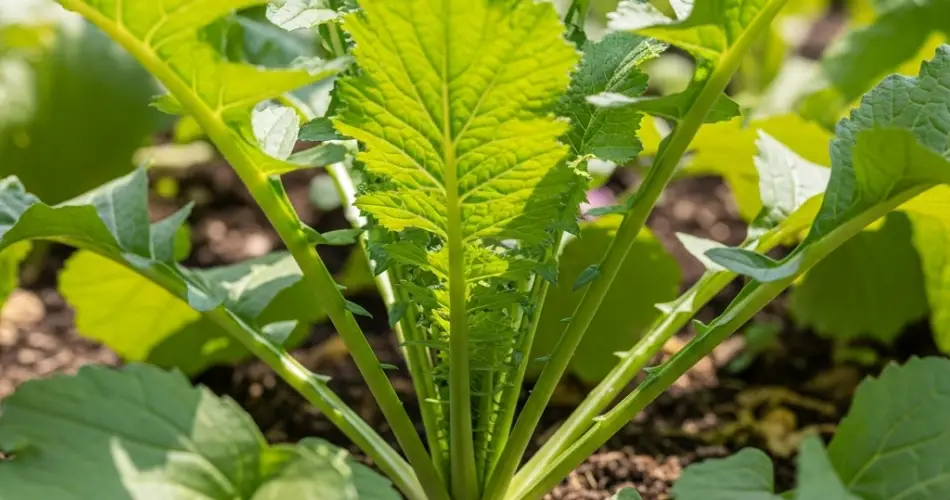Aphids are small, soft-bodied insects that can become a major problem for turnip growers. They feed by sucking the sap from the leaves and stems, weakening the plant, distorting new growth, and potentially transmitting diseases. Fortunately, there are many natural ways to prevent and control aphid infestations without relying on harsh chemicals. Here’s how you can keep aphids off your turnip leaves and maintain a healthy, thriving crop using safe, effective, and eco-friendly methods.
Identify Aphids Early
The first step in managing aphids is early detection. These pests are usually green, but can also be black, white, or even pink, depending on the species. They tend to cluster on the underside of leaves or near the tips of new growth. A regular inspection of your turnip plants—especially the leaves and stems—can help you catch an infestation before it spreads.
If you notice curled, yellowing, or deformed leaves, check closely for aphids. You might also see a sticky substance called honeydew, which aphids excrete and which can attract ants or lead to sooty mold.
Natural Remedies to Get Rid of Aphids
1. Water Spray
One of the simplest ways to dislodge aphids is by spraying the leaves with a strong jet of water from a hose. This method works best when infestations are light. Be sure to spray the undersides of leaves where aphids hide. Repeat this process every few days as needed.
2. Neem Oil Solution
Neem oil is a natural pesticide that works by disrupting the life cycle of aphids. Mix 2 teaspoons of neem oil with a few drops of mild dish soap in a liter of water. Spray this solution on both sides of the turnip leaves, especially where aphids are visible. Use this method in the early morning or late afternoon to avoid burning the leaves in direct sunlight.
3. Garlic or Onion Spray
Garlic and onion are natural repellents that can help deter aphids. Crush a few cloves of garlic or half an onion and steep them in hot water overnight. Strain the liquid and pour it into a spray bottle. Spray your turnip leaves with this mixture once or twice a week to keep aphids at bay.
4. Soap Spray
A homemade insecticidal soap can suffocate aphids on contact. Mix 1 tablespoon of liquid Castile soap (or any mild dish soap) with 1 liter of water. Spray directly onto the aphids. Be careful not to overuse this treatment, as excessive soap can harm your plants. Apply in the early morning and rinse the leaves with clean water after a few hours.
Attract Beneficial Insects
Nature provides its own pest control through beneficial insects that prey on aphids. Encourage these garden allies by planting a diverse range of flowers and herbs.
-
Ladybugs (ladybirds) – One of the most effective natural predators of aphids. Just a few ladybugs can clear out an entire aphid colony.
-
Lacewings – Their larvae are voracious feeders and can consume dozens of aphids daily.
-
Parasitic Wasps – These tiny insects lay their eggs inside aphids, eventually killing them.
To attract these beneficial insects, grow companion plants like dill, fennel, yarrow, marigold, and nasturtium around your turnips. These plants provide shelter and nectar to encourage a thriving population of natural predators.
Practice Companion Planting
Companion planting is a time-tested method of pest control that involves growing plants together that support each other’s growth and repel harmful insects.
-
Plant nasturtiums near your turnips. Aphids are especially drawn to nasturtiums and will often leave your turnips alone in favor of them. Consider nasturtiums a natural trap crop.
-
Garlic and chives can help repel aphids and other pests when planted nearby.
Maintain Healthy Soil and Plants
Healthy plants are better able to resist and recover from pest damage. Make sure your turnips are planted in nutrient-rich, well-draining soil and receive adequate water and sunlight. Avoid over-fertilizing, as tender, nitrogen-rich growth is especially attractive to aphids.
Regularly remove weeds and plant debris where aphids and other pests may hide. Rotate crops each season to prevent pests from settling in one spot year after year.
Final Tips
-
Use row covers to physically block aphids from reaching your turnip plants, especially during early growth stages.
-
Prune heavily infested leaves and dispose of them far from your garden.
-
Always test any spray on a small part of the plant first to ensure there’s no damage.
By combining these natural techniques, you can protect your turnip plants from aphids without resorting to harmful chemicals. With a little attention and consistency, your garden can thrive organically and remain a safe space for beneficial insects and pollinators alike.



